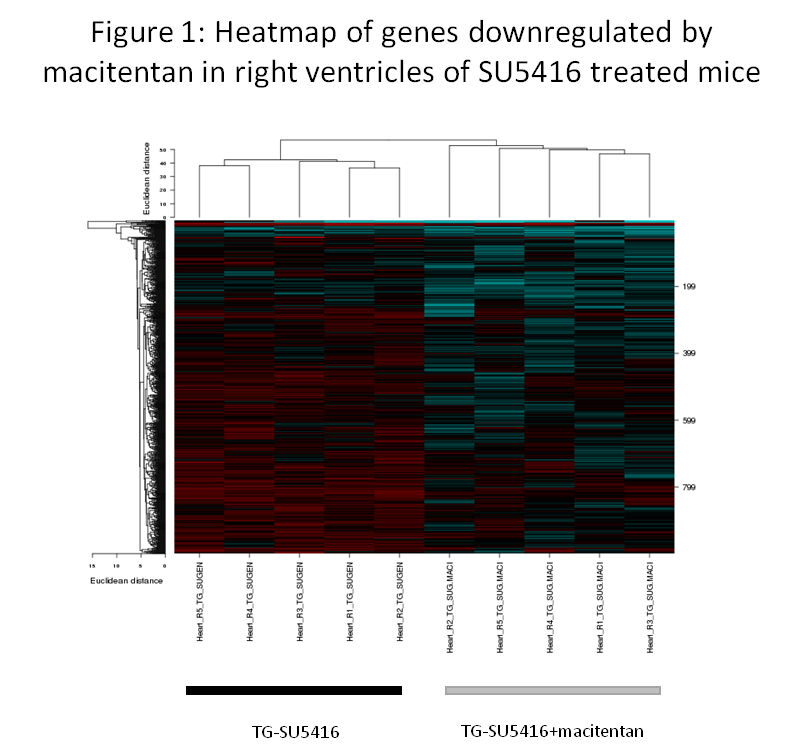Session Information
Date: Monday, November 9, 2015
Session Type: ACR Poster Session B
Session Time: 9:00AM-11:00AM
Background/Purpose: Pulmonary arterial hypertension (PAH) is an important complication
of systemic sclerosis (SSc) that occurs in around 10% of cases. We have previously shown that an imbalance
between TGFbeta and BMPRII signalling
in the transgenic mouse strain TβRIIΔk-fib
contributes to the development of PH following pulmonary endothelial injury. In
this study, we have both prevented and treated PH in this mouse strain using macitentan,
an endothelin receptor antagonist licensed to treat PAH in connective tissue
disease.
Methods: SU5416 was administered to all TβRIIΔk-fib transgenic (TG) mice and littermate wildtype (WT) animals to induce endothelial injury with
subsequent endoluminal proliferation and PH in
transgenic mice only. Mice were treated daily with either macitentan or vehicle
alone (n=8 each group) from either 2 days before or 8 days following SU5416
administration to assess prevention or treatment respectively. The development
of PH in each group was assessed by histology and immunohistochemistry of vessel
architecture, in vivo haemodynamic studies and RV mass index measurements
following 3 weeks of treatment. Microarray analysis of right ventricular tissue
was performed.
Results:
: All TG mice developed a perivascular inflammatory
infiltrate and smooth muscle layer hypertrophy after SU5416 administration. RV mass index was elevated in TG
animals receiving vehicle compared to other groups. In particular
co-administration of macitentan to TG animals treated with SU5416 resulted in
normal RV mass (TG vehicle 0.29±0.007, TG macitentan at day -2 0.24±0.007,
p<0.05). The increase in RV systolic pressure in TG animals treated with
SU5416 was abrogated by macitentan (TG vehicle 28.8±3.2, TG+macitentan
at day -2 22.0±2.9, TG+macitentan at day +8, 24.4±1.8,
p<0.05) without any significant change in systemic arterial blood pressure.
Explanted TG lung fibroblasts showed an increase in TGFbeta
signalling and downregulation of BMPRII compared with
WT littermates following macitentan treatment. Pulmonary
arteriolar occlusion occurred in 21% of vessels in TG mice treated with vehicle
with no occlusion in any other vessels. Gene expression analysis of whole right
ventricle showed alterations in key genes known to be associated with cardiac
muscle remodelling and failure. Figure 1 shows the
cluster analysis of TG mice treated with SU5416 compared with those also
treated with macitentan.
Conclusion:
Macitentan prevents and treats the development of
histological and haemodynamic PH in this mouse model
of SSc. The pivotal role for perturbed endothelin activity in a model that replicates
the imbalance in TGFbeta and BMPRII signalling seen in PAH-SSc lung is shown. It underpins the
value of this model as a platform for experimental therapeutic studies.
To cite this abstract in AMA style:
Derrett-Smith EC, Sobanski V, Gilbane A, Trinder S, Bauer Y, Renault B, Iglarz M, Abraham D, Holmes AM, Denton CP. Macitentan Responsiveness Supports the Validity of a Murine Model of Pulmonary Hypertension in Scleroderma Associated with Altered Tgfbeta/BMPR2 Signalling [abstract]. Arthritis Rheumatol. 2015; 67 (suppl 10). https://acrabstracts.org/abstract/macitentan-responsiveness-supports-the-validity-of-a-murine-model-of-pulmonary-hypertension-in-scleroderma-associated-with-altered-tgfbetabmpr2-signalling/. Accessed .« Back to 2015 ACR/ARHP Annual Meeting
ACR Meeting Abstracts - https://acrabstracts.org/abstract/macitentan-responsiveness-supports-the-validity-of-a-murine-model-of-pulmonary-hypertension-in-scleroderma-associated-with-altered-tgfbetabmpr2-signalling/

